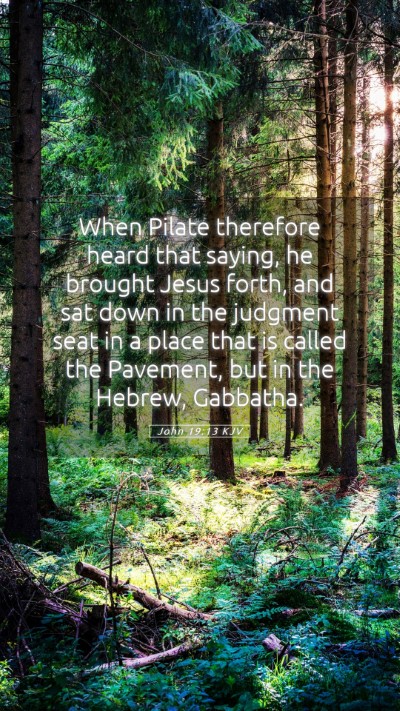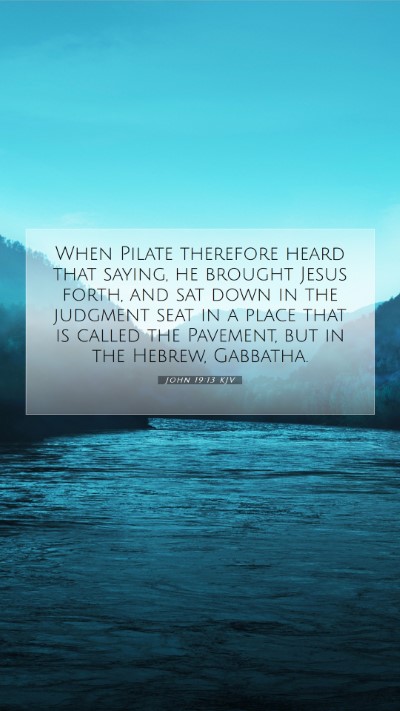Understanding John 19:13
In this analysis of John 19:13, we explore the contextual background and theological implications of this pivotal moment in the New Testament. This passage serves as a significant point in the narrative of Jesus's trial and crucifixion, illustrating the profound dynamics of power, injustice, and the fulfillment of prophetic scripture.
Bible Verse Meaning and Context
John 19:13 states:
"When Pilate therefore heard that saying, he brought Jesus forth and sat down in the judgment seat in a place that is called the Pavement, but in the Hebrew, Gabbatha."
This verse situates Jesus before Pontius Pilate, highlighting the tension and gravity of the moment. Pilate, the Roman governor, is depicted as taking the seat of judgment, suggesting authority and the weight of decision concerning Jesus's fate.
Insights from Commentaries
- Matthew Henry: Henry notes the significance of the "judgment seat" where Pilate sits, symbolizing human authority juxtaposed with divine purpose. He emphasizes how this moment foreshadows the ultimate judgment where Christ will reign as King, despite the temporary authority held by Pilate.
- Albert Barnes: Barnes elaborates on the term "Gabbatha," explaining its roots in Jewish tradition. He comments on Pilate's actions, suggesting that they reflect a reluctance to condemn Jesus despite the demands of the crowd, showing the struggle between political expediency and moral integrity.
- Adam Clarke: Clarke focuses on the location designated as "the Pavement," providing insights into the geographical and cultural backdrop. This setting not only enriches the narrative but also indicates the gravity of the events unfolding, where the fate of Jesus lies in the precarious balance of public sentiment and political maneuvering.
Thematic Elements
This verse encapsulates several key themes found within Bible study insights and Bible verse commentary:
- The Nature of Power: Pilate’s authority is highlighted, yet his consternation over condemning an innocent man underscores the complexities of political power.
- Public Opinion's Influence: The verse reflects how public sentiment sways decisions, a theme that resonates throughout the Gospels.
- Fulfillment of Prophecy: This moment aligns with Old Testament prophecies, revealing God's plan as it unfolds through the actions of human agents.
Application of John 19:13
For those engaged in Bible study groups or seeking Bible study resources, the application of this verse invites a deep reflection on how authority and justice are exercised in the light of personal beliefs and communal pressures.
Furthermore, consider the following applications:
- Personal Integrity: Reflect on your own convictions when faced with societal pressures. How do you uphold your values in challenging situations?
- Understanding Justice: Analyze the concept of justice portrayed in this passage. What parallels can be drawn with contemporary issues of justice and authority?
- Biblical Teaching on Authority: Investigate the biblical view of authority and how it should be balanced with moral responsibility.
Cross References
This verse connects with several other biblical passages that enrich its meaning and context:
- Matthew 27:19 - Pilate’s wife's warning to him about Jesus's innocence.
- John 18:31-32 - The Jewish leaders presenting Jesus to Pilate.
- Luke 23:4 - Pilate declaring Jesus's innocence.
In conclusion, John 19:13 serves as a cornerstone for understanding the complex interplay of authority, prophecy, and justice. By exploring various commentaries, we gain insight into the deeper meanings of this passage and its implications for both the early church and modern believers.
Further Study and Reflection
For those seeking an in-depth Bible verse analysis, consider studying the historical context of the Roman judicial system alongside the cultural dynamics of Jerusalem during Jesus's trial. This will enhance your understanding of how to interpret Bible verses and apply them to daily life.
Engaging with these reflections can lead to a richer Bible verse understanding, fostering growth in personal faith and communal discussion within your Bible study lessons. Reflect on the significance of Jesus's imminent suffering and the injustices faced, drawing parallels with contemporary social justice issues.


